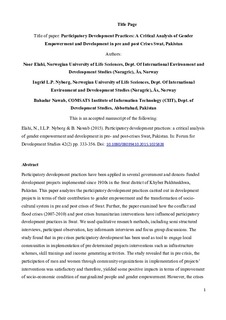| dc.contributor.author | Elahi, Noor | |
| dc.contributor.author | Nyborg, Ingrid L. P. | |
| dc.contributor.author | Nawab, Bahadar | |
| dc.date.accessioned | 2017-12-12T08:50:39Z | |
| dc.date.available | 2017-12-12T08:50:39Z | |
| dc.date.created | 2015-04-08T12:49:36Z | |
| dc.date.issued | 2015 | |
| dc.identifier.citation | Forum for Development Studies. 2015, 42 (2), 333-356. | nb_NO |
| dc.identifier.issn | 0803-9410 | |
| dc.identifier.uri | http://hdl.handle.net/11250/2470540 | |
| dc.description.abstract | Participatory development practices (PDP) have been applied in several government and donor-funded development projects implemented since 1980s in the Swat district of Khyber Pakhtunkhwa, Pakistan. This paper analyzes the PDP carried out in development projects in terms of their contribution to gender empowerment and the transformation of the socio-cultural system in pre- and post-crises of Swat. Further, the paper examined how the conflict and flood crises (2007–2010) and post-crises humanitarian interventions have influenced PDP in Swat. We used qualitative research methods, including semi-structured interviews, participant observation, key informants' interviews and focus group discussions. The study found that in pre-crisis, participatory development has been used as a tool to engage local communities in the implementation of pre-determined project interventions such as infrastructure schemes, skill trainings and income-generating activities. The study revealed that in pre-crisis, the participation of men and women through community organizations in implementation of projects’ interventions was satisfactory, and therefore yielded some positive impacts in terms of improvement of socio-economic conditions of marginalized people and gender empowerment. However, the crises of militancy conflict and flood disaster affected the concept of participation in development projects due to fragility of time, changes in needs and priorities of the people and organizations. This research argues that participatory development can be applied in the reconstruction phase of post-crises development, to achieve the goals of equal distribution of humanitarian aid and uplift the socio-economic conditions of crises-affected people. | nb_NO |
| dc.language.iso | eng | nb_NO |
| dc.relation.uri | http://www.tandfonline.com/doi/full/10.1080/08039410.2015.1025828#.VSUD72PiuVZ | |
| dc.rights | Attribution-NonCommercial-NoDerivatives 4.0 Internasjonal | * |
| dc.rights.uri | http://creativecommons.org/licenses/by-nc-nd/4.0/deed.no | * |
| dc.title | Participatory Development Practices: A Critical Analysis of Gender Empowerment and Development in Pre- and Post-crises Swat, Pakistan | nb_NO |
| dc.type | Journal article | nb_NO |
| dc.type | Peer reviewed | nb_NO |
| dc.description.version | acceptedVersion | nb_NO |
| dc.source.pagenumber | 333-356 | nb_NO |
| dc.source.volume | 42 | nb_NO |
| dc.source.journal | Forum for Development Studies | nb_NO |
| dc.source.issue | 2 | nb_NO |
| dc.identifier.doi | 10.1080/08039410.2015.1025828 | |
| dc.identifier.cristin | 1236022 | |
| dc.relation.project | Norges forskningsråd: 203913 | nb_NO |
| cristin.unitcode | 192,13,1,0 | |
| cristin.unitname | Institutt for internasjonale miljø- og utviklingsstudier | |
| cristin.ispublished | true | |
| cristin.fulltext | postprint | |
| cristin.qualitycode | 1 | |

